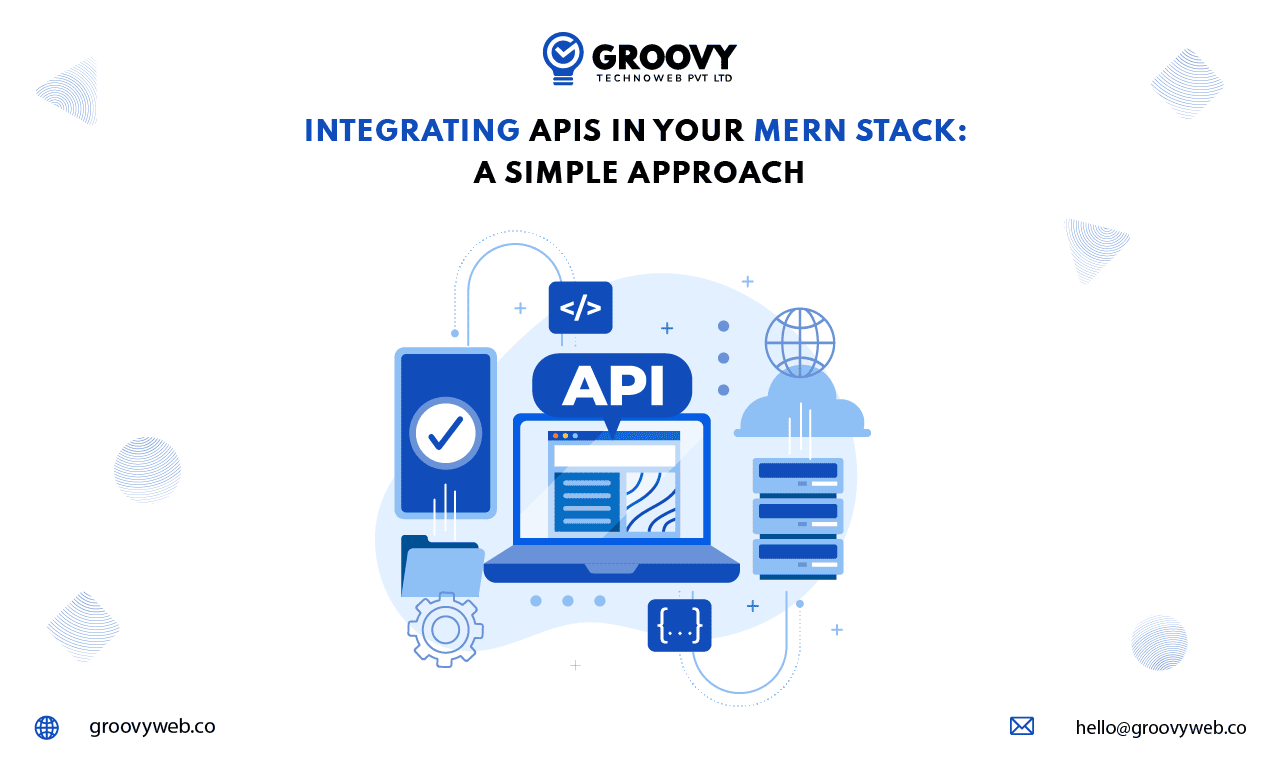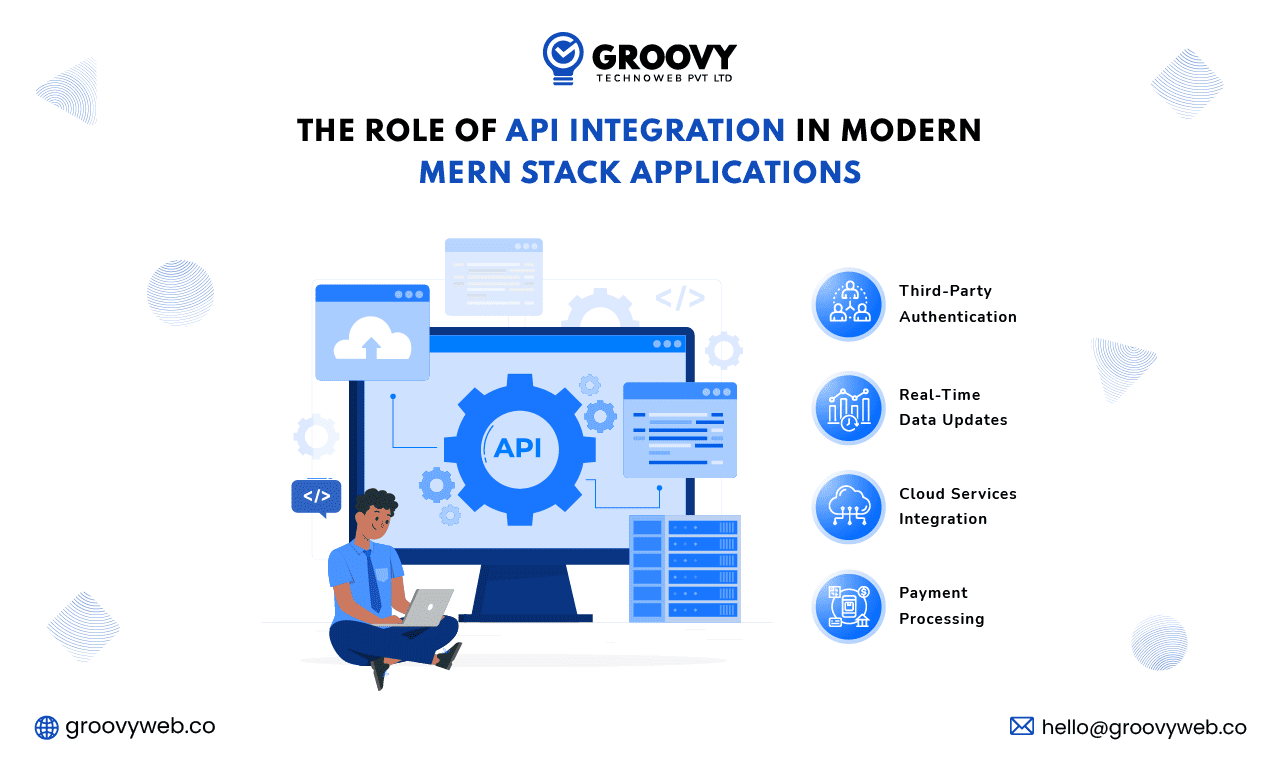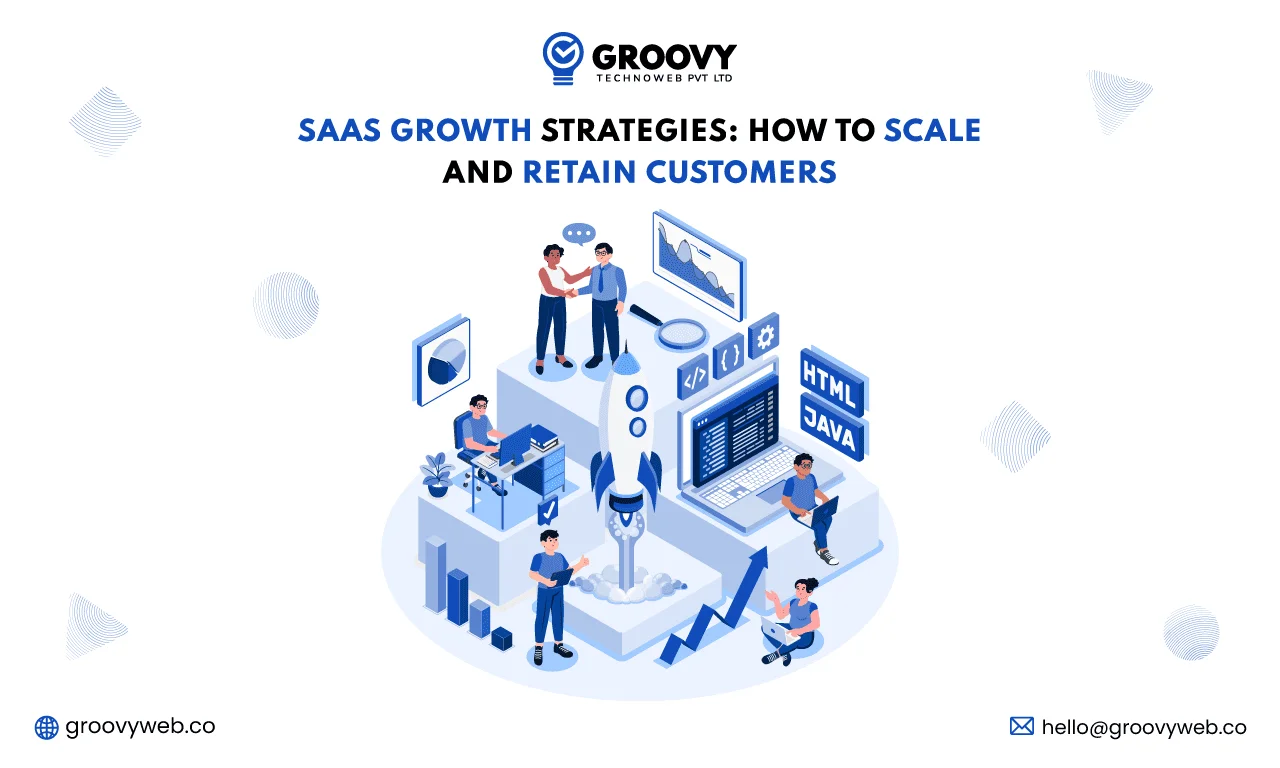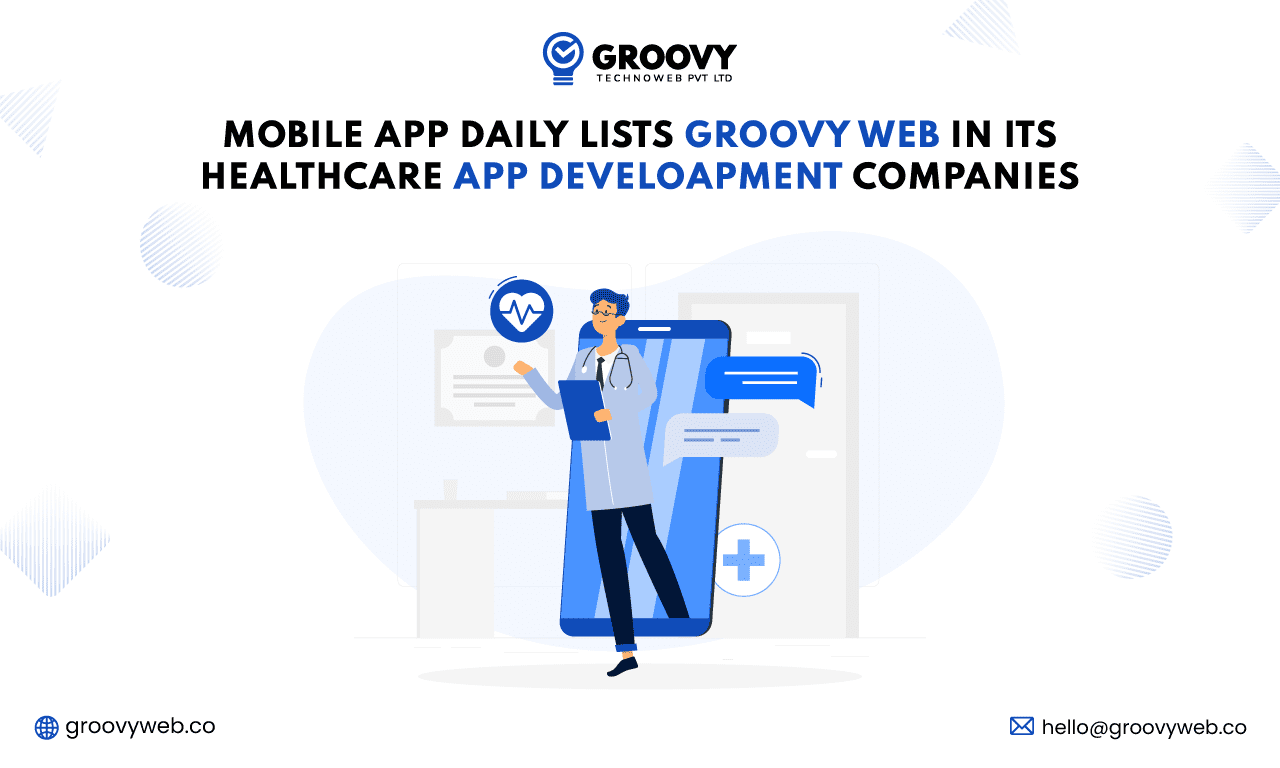Integrating APIs in Your MERN Stack: A Simple Approach
Nauman Pathan
November 05, 2024 228 Views
Quick Summary : APIs become very important when working with a MERN stack development to create scalable, real-time applications that offer features such as user authentication, updated data, and integration with other cloud services. A collection of tools that can be used for handling API requests includes MongoDB, Express.js, React, and Node.js, while Next.js development services improve performance through features such as server-side rendering and static site generation. Next.js enhances performance, SEO, and user experience making it ideal for businesses that develop high-performance apps. Reading this article will help you understand everything regarding API integration and learn how Next.js benefits the MERN stack development.
The modern world is digital-oriented, and to fully meet the expectations of users, high-quality, highly scaled, and adaptive web applications are required. The combination of MongoDB, Express.js, React, and Node.js, referred to as the MERN stack Development, has become one of the most convening frameworks for full-stack web development that helps use cutting-edge program interfaces for creating web applications. However, as real-time data, third parties, and added functionalities are often required, it is vital to address the integration of APIs into the MERN stack development process to ensure performance.
APIs (Application Programming Interfaces) are interfaces through which the applications can communicate with the world outside and exchange information easily. Suppose you are ever in a position where you require user authentication, real-time data from a third-party service or application, or input or output from cloud services. In that case, API means endless possibilities for the application. The question, however, is how this integration is managed well within the MERN stack development process.
Combining the Next js development services with the MERN stack offers benefits such as optimized API integration options, including SSR, SSG, and superior performance. For businesses, getting help from a MERN stack web development company that is fully aware of these complexities can enhance the app’s performance, flexibility as well as usability.
Revisiting the MERN Stack: A Foundation for Scalable Applications
Before we dive into API integration, let’s take a closer look at the MERN stack development process and its capabilities:
- MongoDB: MongoDB is a non-relational (NoSQL) database that is document-based and supports a document-oriented NoSQL data model based on JSON format. In addition, it makes data storage and retrieval relatively flexible and since it supports the unstructured data type, it is suitable for applications with evolving data structure. In the process of integration with APIs, MongoDB acts as an intermediate layer for data caching and storage, which is very important when working with real-time data obtained from external services.
- Express.Js: Express is a fast and lightweight Nodejs Web framework used for designing Web applications with server-side logic and building RESTful APIs as well. It can handle the routing, middleware, and API requests that link the application to the database (MongoDB), the front end (React), and external APIs.
- ReactThe frontend framework React is used to implement client-side views with smooth and sophisticated user interaction. The idea of breaking it down into components helps when updating and displaying data that is retrieved from APIs. Moreover, when you opt for Next.js development services, performance is boosted even in react applications through server-side rendering (SSR), static site generation (SSG), and incremental static regeneration (ISR).
- Node.js: Node.js is the runtime environment where JavaScript can be used on the server side of the application. This serves as the foundation of the MERN stack’s server-side processing capability, which allows the application to manage asynchronous API requests and scale under pressure.
The Role of API Integration in Modern MERN Stack Applications
API integration is a way to customize the available web application into enhanced, more functional applications. By connecting your MERN stack development process with external APIs, you can bring a wide range of services into your app, such as:

- Third-Party Authentication: OAuth 2.0 is an API that allows you to connect secure user sign-in with services such as Google, Facebook, or Twitter. This makes it easier for users to sign in and enables proper access control to resources within your application.
- Real-Time Data Updates: This means that when you get involved with APIs on a particular application like supplying live stock market data, real-time weather updates or sports scores, you are in a position to give your users real-time information for a more interesting experience.
- Cloud Services Integration: Several APIs from leading cloud providers like AWS, Google Cloud, and Azure allow you to integrate highly functional components into your app, including file storage, third-party, machine learning, or serverless computing.
- Payment Processing: In e-commerce applications, payment APIs from popular payment gateways like Stripe, PayPal, Square, etc., make the payment integration easy and secure allowing the users to complete their transactions within the application.
Backend API Integration with Node.js and Express
The first thing you need to do before you integrate an API into your MERN stack development process is set up a solid backend with Node.js and Express.js. This will be the core container of your application which contains most of the integration logic of the API. Its functions include sourcing API information, analyzing the data, and transmitting the results to the front end (React) safely and efficiently.
a) Setting Up Express Routes for API Requests
Express is a framework that can be utilized to efficiently set up routes that can handle API requests in MERN stack development. For instance, you may have routes connected to the acquisition of weather data from a third-party API, the acquisition of news articles, and the processing of users’ data.
Express routes serve several key functions:
- Handling API Requests: Express routes wait for communication from the frontend layer. These requests could be parameters like passing a city name for the weather API to fetch some data from the external API.
- Making External API Calls: After the request is made, Express can then make an API call asynchronously using tools. The data can be manipulated and analyzed before being returned to the front end from the API obtained from the data source.
- Securing API Requests: Data that is considered confidential such as API keys is not made available to users and is stored on the backend. By handling API requests on the server side, you ensure an additional security layer within your application.
b) Handling API Keys Securely with Environment Variables
One of the most important challenges that arise when working with APIs is security. APIs are often protected by API keys or tokens through which the API is accessed, and these must be safeguarded. In Node.js these keys are usually kept in environment variables.
This method helps eliminate the situation where you are exposing some crucial data into your code base especially when deploying the application to production. In MERN stack development, using environment variables will help to keep API keys hidden from everyone apart from the server, thus minimizing security threats.
c) Error Handling and Rate Limiting
One of the issues with another component integration in MERN stack development is that APIs can sometimes be unreliable and thus can be down, or they have a certain amount of requests an application can make to them within a certain timeframe. For example, an API may restrict the amount of requests your application can make to 1000 in a day or within a certain number of seconds.
Here, with the help of Express in MERN stack development, you can develop effective error handling and rate-limiting techniques so that your application will not go down if the API is down or if you exceed the allowed amount of requests.
Frontend API Integration in React
Once in the backend, it is essential to fetch and process the data from the API and render it on the front end using React. That is why working with components allows you to quickly and easily read data into React’s virtual DOM, store it, and then return it to the browser. However, client-side rendering may not be optimal for some applications where SEO and performance are crucial, and this is where Next.js development services become useful in the MERN stack development process.
Next.js enhances React with server-side rendering (SSR) and static site generation (SSG):
- SSR renders pages on the server and sends fully constructed HTML to the client, which enhances page loading and promotes SEO as search engines can identify the content easily.
- SSG generates static HTML during the build process and is more appropriate for websites that are not frequently updated, resulting in faster page loads.
These features make next.js a robust framework that adds performance optimization along with React which enhances the site’s usability and SEO.
Storing and Caching API Data in MongoDB
Although the API data should be extremely timely, frequent API requests are only inefficient and more expensive, particularly when it involve rate-limited APIs. This is a problem that MongoDB addresses in MERN stack development, as it can cache the data of the API so that it does not need to be requested several times.
- a) Caching API Data for Performance
Caching is a method of storing API data for some time, this makes regularly accessed data, (like weather, product info, etc) to be fetched without having to call the API next time. This enhances the loading of the programs and avoids reaching the maximum API limits. For example, in an e-commerce application, product information can be stored in MongoDB which helps to minimize the number of API requests and improve the speed. - b) Storing User-Specific Data
MongoDB can also store user-specific data like preferences, shopping carts, or transaction logs to tailor the end user’s experience. In MERN stack development, storing such data allows apps to give consistent user experiences regardless of how long the user has been inactive.
Securing API Integration in MERN Stack Applications
API integration security plays a critical role in protecting critical data, including API keys, user data, and payment information. In MERN stack development, security can be handled at multiple layers to ensure the protection of these critical assets and safeguard the application’s integrity.
- a) Environment Variables for API Keys
API keys should be stored in an environment variable; they should not be imposed directly into the application source. Rather, they should be stored in environment variables using the .env file, especially when working with cloud computing, as any unauthorized person can easily access the information stored here. This eliminates the possibility of exposing these credentials in source control while only the server has permission to touch them. - b) Token-Based Authentication
By employing JWTs, token-based authentication guarantees that only authorized users can access certain aspects of an application. This is important in MERN stack development for protecting API endpoints and authenticating the user before any API calls, for instance, when updating profile details. - c) Implementing API Rate Limiting
Rate limiting should be achieved on the server level to prevent API request limits. This reduces possible overloading, protects from further abuse, and keeps the app sustainable by limiting the frequency of API requests.
Leveraging Next.js Development Services with the MERN Stack
The adoption of Next.js development services alongside the MERN stack development process offers numerous advantages for web application development, particularly when building high-performance and scalable web applications. Whether you’re developing a content-heavy site, an e-commerce platform, or a real-time data dashboard, Next.js provides key features that enhance your app’s performance and flexibility.
- Server-Side Rendering (SSR): Next.js comes with inbuilt solutions for SSR, besides which you can carry out page pre-rendering on the server side for enhanced first impressions and better search engine rankings. This is very helpful on websites that have data that change frequently, like blogs, stores, or profiles.
- Static Site Generation (SSG): Next.js optimizes performance by generating static HTML files at build time and loading full pages instantly on the server. This is well suitable for pages that rarely change such as marketing pages or a company’s product portfolio pages.
- Incremental Static Regeneration (ISR): ISR helps keep static Web pages updated in real-time without requiring rebuilding the full website. This feature is more helpful for applications where the content is updated often but not in real-time (e.g., articles or products).
- API Routes: Next.js also allows you to create API routes inside the application, which allows you to work on the server without a backend. This makes development easier and ensures that all of your API-related logic is in a single framework.
With these features, the next.js development services assist in the achievement of the possibility of deploying web applications with enhanced performance, SEO friendly while strengthening its capability of scalability by the increasing number of users. When combined with MERN stack development this creates a very strong tool for building dynamic, scalable, and business-like web applications.
Conclusion
APIs in conjunction with the MERN stack help developers create rich and dynamic applications for web applications. When you integrate MongoDB, Express.js, React, and Node.js, you get a framework that can effectively handle data acquisition, manipulation, and presentation tasks efficiently. Incorporating Next.js development services into your MERN stack development process adds value to your app by including SSR, SSG, and API in the development process.
Depending on the problem domain, you may need to build a real-time data dashboard, a content-driven website, or an e-commerce platform, and API integration within the MERN stack is the key to its capacity. For businesses or developers, it is essential to work with a MERN stack development company that provides services for MERN stack as well as Next.js development to bridge the gap between a standard business application and one that is capable of providing performance and features for a more tech-savvy and sophisticated user.
With the right tools and strategies, API integration can enhance your MERN stack development application and deliver a smooth, fast, and enjoyable experience to users.
Written by: Nauman Pathan
Nauman Pathan is a Project Manager at Groovy Web - a top mobile & web app development company. He is actively growing, learning new things, and adapting to new roles and responsibilities at every step. Aside from being a web app developer, he is highly admired for his project management skills by his clients.
Frequently Asked Questions
We hope these clear your doubts, but if you still have any questions, then feel free to write us on hello@groovyweb.coIn what ways does Next.js improve performance in MERN stack applications?
Next.js enhances the performance of MERN stack development applications in terms of server-side rendering (SSR) and static site generation (SSG). This is because SSR renders the content on the server side which includes faster initial loading time and better SEO since the search engines can index them easily. SSG, however, creates static HTML files during a project's build process and is more efficient in loading times, primarily for websites with less variability in content updates, for instance, blogs or product pages.
What is the benefit of using environment variables for storing an API key for a MERN stack application?
Storing API keys in environment variables helps protect sensitive data from being revealed on the client side hence enhancing security. In MERN stack development, environment variables are usually placed in a .env file which prevents sensitive information such as API keys from being easily readable by others. This approach reduces security threats especially when implementing the application in cloud platforms.
How can MongoDB be used to increase API efficiency in a MERN stack development application?
MongoDB can keep records of the frequently requested API results like product data, weather data, or user activity history and eliminate the need to request the API all over again. In MERN stack development, using MongoDB to store the API data, the application can provide cached results for subsequent uses while preventing frequent requests to external APIs to get the data which in some cases might reach rate limiting. This not only increases efficiency but also reduces the cost of API and provides data faster for users.
Why are Next.js development services beneficial for MERN stack applications in businesses?
Businesses should turn to Next.js development services because Next.js brings value to MERN stack development applications by boosting performance, scalability, and SEO. Next.js uses server-side rendering (SSR) and static site generation (SSG) to improve page speed and make content more discoverable by search engine crawlers. When it comes to dynamic, real-time content and apps targeting users who found the app via search engines, the usage of Next.js becomes immensely useful in terms of visibility, user interaction, as well as the app user experience.
Related Blog

Rahul Motwani
SaaS Growth Strategies: How to Scale and Retain Customers
Software Development 02 Apr 2025 8 min read
Kartik Bhaviyash
MobileAppDaily Lists Groovy Web in its Healthcare App Development Companies 2023
Achivements 13 Nov 2024 2 min readSign up for the free Newsletter
For exclusive strategies not found on the blog
